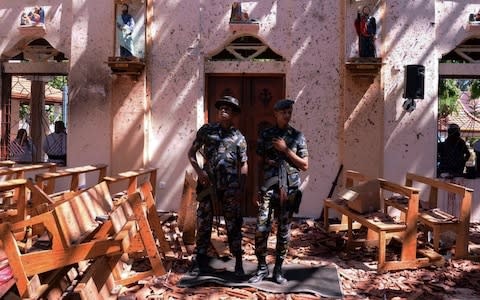Analysis: Sri Lanka terrorists want sectarian violence, economic sabotage, and political collapse

The tourist trade calls it “India lite” - a laid-back paradise of perfect beaches and weather with all the culture but a softer pace of life.
But the horrific slaughter that unfolded in churches and hotels in Sri Lanka on Easter morning seemed designed to wreck that reputation, stoke sectarian tension, and destabilize an already febrile political situation.
Perhaps the most worrying thing about the attacks is that they have so little in common with the island's recent, violent history.
Whoever carried out the attacks appears not to have been emulating the now defunct Tamil Tigers insurgent group, but the bloodthirsty tactics of militant Islamist groups like al-Qaeda and Islamic State, neither of which have a previously known presence on the island.

And it does not take an evil genius to see what the attackers were trying to achieve.
The first goal appears to be to spark further violence. There has been a striking uptick in nationalist sentiment among the predominantly Buddhist, Sinhalese majority in Sri Lanka, and in recent years tensions with the Christian and Muslim minorities, which each make up no more than ten percent of the population, have been growing.
In March last year, the government declared a state of emergency after Buddhist mobs attacked a mosque in the central district of Kandy.
In such an atmosphere it would be easy - perhaps tempting - to respond with a state of emergency, cracking down on civil rights and scapegoating whatever community the attackers turn out to hail from. The dangers of doing so are obvious.

The second goal is to wreak economic damage. Security experts say they have never seen such a deliberate targeting of civilians by suicide bombings, and certainly not deliberate attacks on big hotels that lure Western tourists.
Tourism is a mainstay of Sri Lanka's post-war economic recovery, with visitor numbers more than quadrupling from around 500,000 in 2009 to over two million a year today. With the economy struggling in the aftermath of a recent political crisis, a blow to tourism could be devastating.
The attackers will presumably have hoped that the dysfunction in Sri Lankan domestic politics would make a hardline response more likely.
Last year, Sri Lanka's government was paralysed by a constitutional crisis as Mahinda Rajapaksa, a former president, attempted to replace Ranil Wickremesinghe as prime minister.
It left the government looking ineffectual - an impression only heightened when Mr Wickremesinghe made the astonishing claim that security services had received prior intelligence about the attacks but failed to inform him - or anyone else in his government.
As Charu Lata Hogg of Chatham House points out, Sri Lanka is not New Zealand.
It has suffered thousands of deaths in decades of sectarian warfare, and there are very real sectarian divisions. But there is, she argues, reason for cautious optimism.
The first reaction has been universal shock: a coming together of different communities show that, on the surface at least, they all reject the violence.

